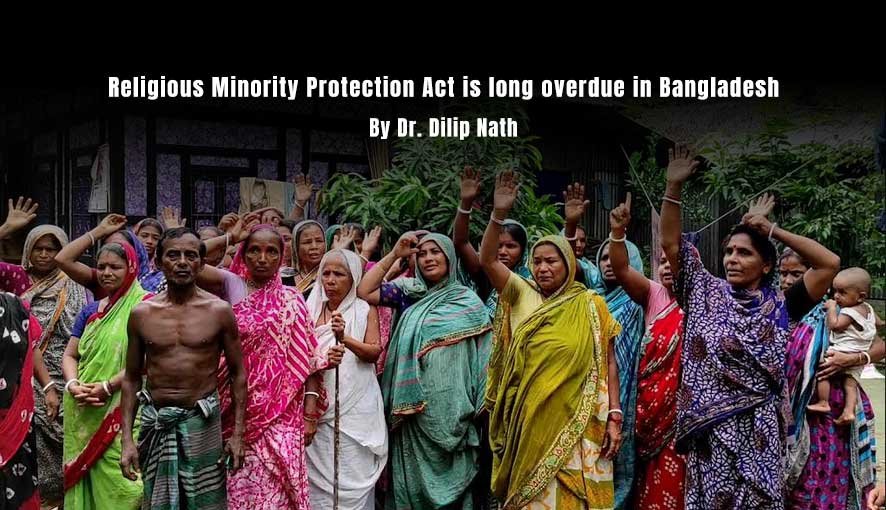
By Dr. Dilip Nath
General Background on Bangladesh:
Human rights organizations report that minority religious groups in Bangladesh, particularly Hindus, Buddhist and Christians, face harassment, physical threats, and social isolation. Violence against minorities in communities remained throughout the year, according to the Bangladesh Hindu Buddhist Christian Unity Council (BHBCUC). Amnesty International has reported violent attacks on the Hindu community, including on their homes, temples, and puja pandals, during the country’s main Hindu holiday. According to the US Commission on International Religious Freedom, religious minorities in Bangladesh face discrimination (Andaleeb et al, 2007).
Bangladesh’s population is projected to be 166 million people, according to the World Bank’s most recent figures. According to the World Bank, the country’s demographic landscape is characterized by its young population, with a median age of around 27 years. This youthful age distribution implies that there may be a substantial working-age population in the coming years.
In terms of religion, Bangladesh is commonly recognized as a country with a Muslim majority. According to Pew Research Centre statistics, a sizable proportion of the population, over 90%, professes to be Muslim. The nation’s culture, customs, and societal conventions are heavily impacted by its Islamic heritage, which also adds to its distinct international identity.
Bangladesh, on the other hand, has a diverse religious landscape in addition to its Muslim majority. Hindus make up a substantial portion of the religious minority, accounting for around 8.5% of the population. The specific practices and cultural contributions of this minority enrich the country’s social fabric. Furthermore, with 0.6% and 0.4% of the population, respectively, Buddhism and Christianity are smaller but nonetheless substantial segments of the society. These communities contribute to Bangladesh’s great cultural variety via their different holidays, rituals, and worldviews (Mostofa, 2021).
Smaller religious organizations, which account for around 0.5% of the total population, contribute to the religious landscape’s diversity. This blending of numerous religions contributes to the nation’s religious plurality by creating a context in which many ideologies may and frequently do coexist, weaving a beautiful tapestry of mutual respect and sympathy.
The current Hasina administration has said that the Minority Protection Act would be passed before the 2018 election. However, a worrisome tale has arisen since then, with religious extremists, fundamentalists, and nationalists waging an unending campaign of persecutory violence. As a result, a significant number of minorities have sought sanctuary in India, resulting in a drop in their proportion in the national population from 17% in 1998 to 9.1% now. According to Professor Barakat’s estimates, which take into consideration the current rate of forced migration, the future looks frighteningly dismal. If this worrying trend continues, Bangladesh’s Hindu minority group is expected to vanish within the next 25 years, putting the country’s 9.1% surviving population at risk of strife and maybe extinction Office of International Religious Freedom (2022).
Factors causing a decline in religious minorities in Bangladesh
Rise of Militant Islam: The development of militant Islam is one of the factors contributing to the decline in the number of religious minorities in Bangladesh. Extremist organizations, according to Andaleeb et al, (2007), have persecuted, discriminated against, and utilized violence against religious minority communities.
Discrimination and Marginalization: Religious minorities in Bangladesh face discrimination and marginalization in a variety of settings, including public services, employment, and education. According to the Office of International Religious Freedom (2022), this may be a contributing cause to their demise.
Land and property issues: Religious minority in Bangladesh have also experienced a variety of significant land and property issues. In accordance with Riaz and Aziz (2017), certain laws and procedures have been employed to evict religious minority populations from their houses.
Social and economic factors may also contribute to the decrease of religious minorities in Bangladesh, including poverty and a lack of opportunity. The Office of International Religious Freedom (2022) asserts that these elements may make religious minority populations’ marginalization and discrimination worse.
Rise of militant Islam and its impact on democracy in Bangladesh
The democracy of Bangladesh has been impacted by the rise of radical Islam in that nation. An environment of fear and dread has been produced by extremist organization’s targeting of academics, secular campaigners, and religious minorities.
The political atmosphere in Bangladesh has been impacted by the influence of radical ideologies as well, with certain political parties and leaders forming alliances with religious extremist groups for political advantage.
There is growing worry regarding Bangladesh’s democratic ideals, freedom of expression, and religious liberty as a result of the emergence of militant Islam. Additionally, it has decreased the room for criticism and restricted civil freedoms.
Importance of protecting religious minorities
Quote: “Without Protection the religious minority their can’t be no Democracy”
Because there can be no true democracy without the protection of religious minorities, defending religious minorities is critical to the survival of democracy in Bangladesh. Regardless of a person’s religious or political beliefs, democracy requires the protection of their rights and liberties. When religious minority face discrimination, marginalization, or persecution, it goes against democratic norms and can lead to the breakdown of societal cohesion and stability (Mostofa, 2021).
Concerns have been made regarding the erosion of democratic principles, freedom of expression, and religious freedom as a result of the spread of militant Islam and its repercussions on Bangladesh’s religious minority. When radical ideas are allowed to evolve, they can lead to a reduction in the space for dissent and a limitation of civil liberties, both of which are required for a democracy to function.
Religious minority who face prejudice and marginalization may not be appropriately represented or involved in political processes. The lack of diversity and representation in decision-making processes that may come from the exclusion of religious minorities from political and social life might threaten the authority of democratic institutions.
According to international human rights law, preserving religious minorities is both morally important and legally mandated. The Universal Declaration of Human Rights and the International Covenant on Civil and Political Rights are just two of the international human rights agreements that Bangladesh has accepted, both of which mandate that religious minorities be respected. These promises must be kept in order to maintain the rule of law and advance democratic values (Mostofa, 2021).
In general, religious minorities must be protected if Bangladesh is to sustain its democracy and defend the ideals of social justice and human rights.
What government must to do to save the remaining of religious minorities in Bangladesh?
In order to safeguard Bangladesh’s remaining religious minorities, the government must make the following efforts:
Enact and enforce legislation that protects religious minority’ liberties and rights. This includes ensuring that everyone has equal access to public services, work, and education, as well as protecting religious minority populations from discrimination, reprisal, and violence.
Address land and property disputes that have damaged religious minority’ communities. The government should ensure that religious minority communities are not relocated and that laws and rules are not used to gain control of their property (Chaney & Sahoo, 2020).
Public education and awareness campaigns should be employed to increase public understanding of the rights of religious minorities and applicable legislation. Prejudice and marginalization can be reduced through promoting social understanding and solidarity.
The judiciary should take a larger role in defending the rights of religious minorities. A law or policy must conform to international human rights standards, and the judiciary must be impartial and independent in making this conclusion.
Fight back against the growth of militant Islam and other extremist ideologies directed at religious minorities. Taking steps to prevent and hold responsible acts of violence and discrimination against religious minorities, as well as encouraging interfaith communication and understanding, are all part of this (Mostofa, 2021).
Respect the obligations and commitments established in connection to international human rights that demand for the protection of religious minorities. Bangladesh has ratified the International Covenant on Civil and Political Rights and the Universal Declaration of Human Rights, two international human rights treaties. Religious minorities should be legally protected, and the government should ensure that these promises are followed.
Why it’s important to implement it before the next election (National election in 2024)
The implementation of a Religious Minority Protection Act is critical, especially in the run-up to the parliament election in 2024. Such action is critical in order to defend the rights and welfare of religious minorities in Bangladesh. It is critical that it be implemented before to the election for a variety of compelling reasons.
First and foremost, the Religious Minority Protection Act would demonstrate the government’s commitment to the concepts of equality, human rights, and religious freedom. By passing this law, the government may demonstrate its commitment to building an inclusive and peaceful society that respects and defends the rights of all citizens, regardless of their beliefs. This audacious move will enhance not just the nation’s standing abroad but also public confidence in the political establishment.
Second, by ensuring religious minority’ protection, this policy would assist to maintain societal peace and stability. The Act would prevent the spread of intolerance and extremism by creating legal mechanisms to address acts of discrimination, violence, or other injustices directed towards religious minorities. This will so foster a sense of national harmony by fostering an environment conducive to interfaith understanding, peaceful coexistence, and togetherness among diverse religious groups (Chaney & Sahoo, 2020).
Third, enacting the Religious Minority Protection Act before the 2024 parliament election would demonstrate the government’s commitment to democratic ideals. By addressing concerns related to their rights and security, the government may alleviate potential fear among religious minorities and assure their active and meaningful involvement in the voting process. This openness is essential for a free and transparent election that fairly represents the numerous national perspectives.
Furthermore, enacting the law before the election would allow adequate time for the formation of relevant groups, legal structures, and awareness campaigns. This planning is critical to ensuring the proper implementation and enforcement of the act’s obligations. By using these instruments before to the election, the government may demonstrate its commitment to a seamless transition to a more equal and inclusive society (Riaz & Aziz 2017).
Last but not least, deploying it before the 2024 parliament election would protect the problem from being utilized as a political pawn. To prevent being exploited as a political football, protecting religious minorities should be handled before the election. This method contributes to the development of a constructive, forward-thinking political discourse that prioritizes the well-being of all people (Chaney & Sahoo, 2020).
In conclusion, implementing a Religious Minority Protection Act before the next national election in 2024 is of paramount importance. It reflects the government’s commitment to human rights, social harmony, and democratic values, while also fostering an environment where all citizens can actively participate in the electoral process without fear or prejudice. By taking this timely and proactive step, Bangladesh can reaffirm its dedication to inclusivity and equality, setting a positive precedent for the nation’s future.
References
Andaleeb, S. S., Islam, N., Rashid, S., Uddin, A. R., Masum, M., Murshid, N., … & Rahman, A. A. Bangladesh Studies. Journal of ISSn, 1529, 0905. https://jbs.bdiusa.org/system/files/free-pdfs/Vol%2009.%20Num%202.%202007.%20Article%202%20-%20Democracy%20in%20Bangladesh%20-%20From%20Crisis%20to%20Sustainability.pdf
Chaney, P., & Sahoo, S. (2020). Civil society and the contemporary threat to religious freedom in Bangladesh. Journal of Civil Society, 16(3), 191-215. https://www.tandfonline.com/doi/pdf/10.1080/17448689.2020.1787629
Mostofa, S. M. (2021, December 4). Minority rights at stake in Bangladesh. University of Dhaka. https://www.eastasiaforum.org/2021/12/04/minority-rights-at-stake-in-bangladesh/
Office of International Religious Freedom. (2022, June 2). 2021 Report on International Religious Freedom: Bangladesh. https://www.state.gov/reports/2021-report-on-international-religious-freedom/bangladesh/
Riaz, A., & Aziz, S. S. (2017). Democracy and sharia in Bangladesh. RESOLVE Network Research Brief, 3. https://www.resolvenet.org/index.php/system/files/2018-08/RSVE_03BangladeshBrief_ShariaDemocracy2017.pdf
























